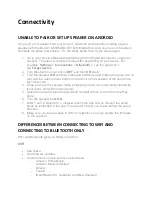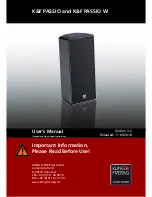
7
AMPLIFIER SECTION
Bass amplifier output power with an 8 Ohm load: 40 W
Treble amplifier output power with an 8 Ohm load: 40 W
Long term output power is limited by driver unit protection
circuitry.
_____________________________________________
Amplifier system distortion at nominal output:
THD
< 0.08 %
SMPTE-IM
< 0.08 %
CCIF-IM
< 0.08 %
DIM 100
< 0.08 %
_____________________________________________
Signal to Noise ratio, referred to full output:
Bass
> 100 dB
Treble
> 100 dB
_____________________________________________
Mains voltage:
100, 120, 220 or 230 V
according to region
Voltage operating range:
±10 %
Power consumption:
Idle
10 W
Standby
<0,5 W
Full output
80 W
SYSTEM SPECIFICATIONS
Lower cut-off frequency, –3 dB:
< 55 Hz
_____________________________________________
Upper cut-off frequency, –3 dB:
> 21 kHz
_____________________________________________
Free field frequency response of system:
58 Hz – 20 kHz (± 2.0 dB)
_____________________________________________
Maximum short term sine wave acoustic output on axis in
half space, averaged from 100 Hz to 3 kHz:
@ 1 m > 100 dB SPL
@ 0.5 m > 106 dB SPL
_____________________________________________
Maximum long term RMS acoustic output in same
conditions with IEC weighted noise (limited by driver unit
protection circuit):
@ 1 m > 97 dB SPL
_____________________________________________
Maximum peak acoustic output per pair @ 1 m distance
with music material:
> 108 dB
_____________________________________________
Self generated noise level in free field @ 1m on axis:
< 10 dB (A-weighted)
_____________________________________________
Harmonic distortion at 85 dB SPL @ 1m on axis:
Freq:
50…100 Hz < 2 %
>100 Hz < 0.5 %
_____________________________________________
Drivers: Bass
130 mm (5") cone
Treble
19 mm (
3
/
4
") metal dome
Both drivers are magnetically shielded
_____________________________________________
Weight:
5.5 kg (12.1 lb)
_____________________________________________
Dimensions:
Height
285 mm (11
1
/
4
”)
Width
189 mm (7
7
/
16
")
Depth
118 mm (7
1
/
16
”)
CROSSOVER SECTION
Input connector:
Balanced 10 kOhm
_____________________________________________
Input level for 100 dB SPL output at 1 m:
-6 dBu at level control max
_____________________________________________
Level control range:
-40 dB relative to max output
_____________________________________________
Crossover frequency, Bass/Treble:
3.0 kHz
_____________________________________________
Treble Tilt control operating range:
0 to –2 dB @ 15 kHz
_____________________________________________
Bass Roll-Off control operating in a –6 dB step @ 85 Hz
_____________________________________________
Bass Tilt control operating range in –2 dB steps:
0 to –6 dB @ 100 Hz
_____________________________________________
The ‘CAL’ position is with all tone controls set to ‘off’ and
the level control to maximum (fully clockwise).
Summary of Contents for 4030BWM
Page 1: ...4030B Operating Manual ...
Page 8: ......


























